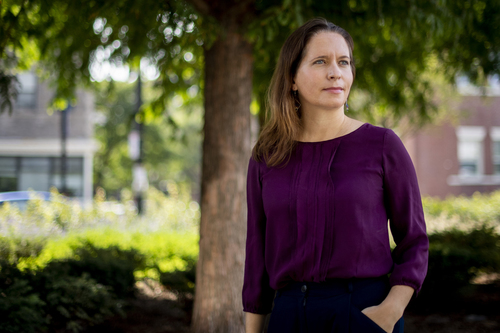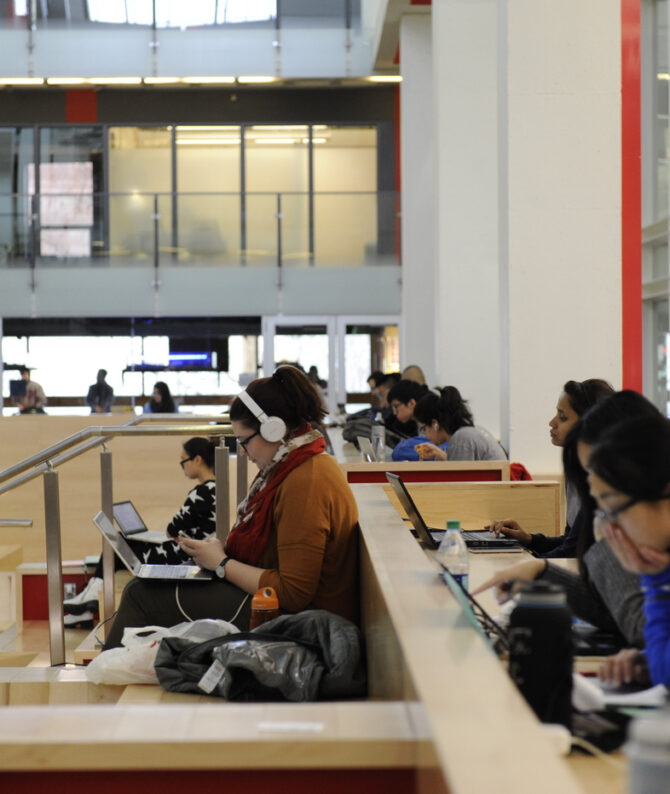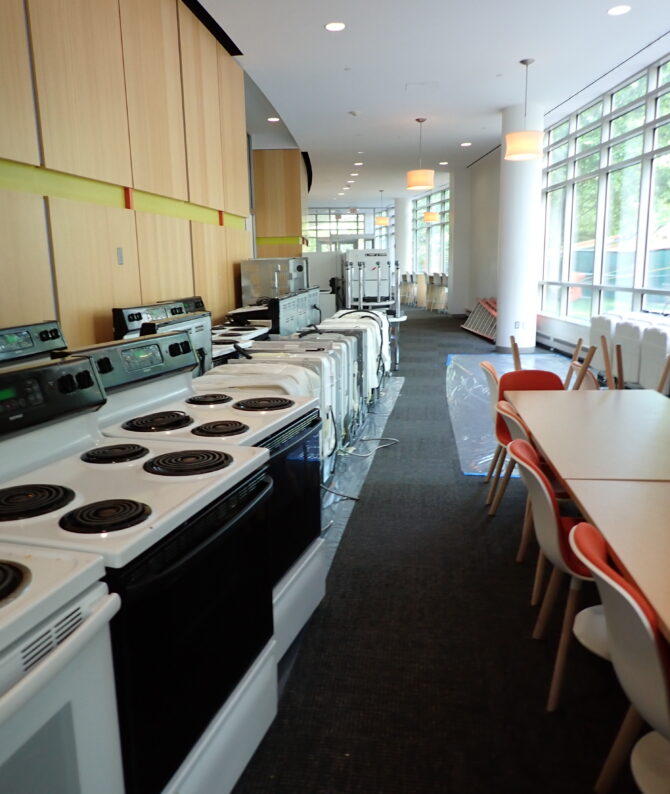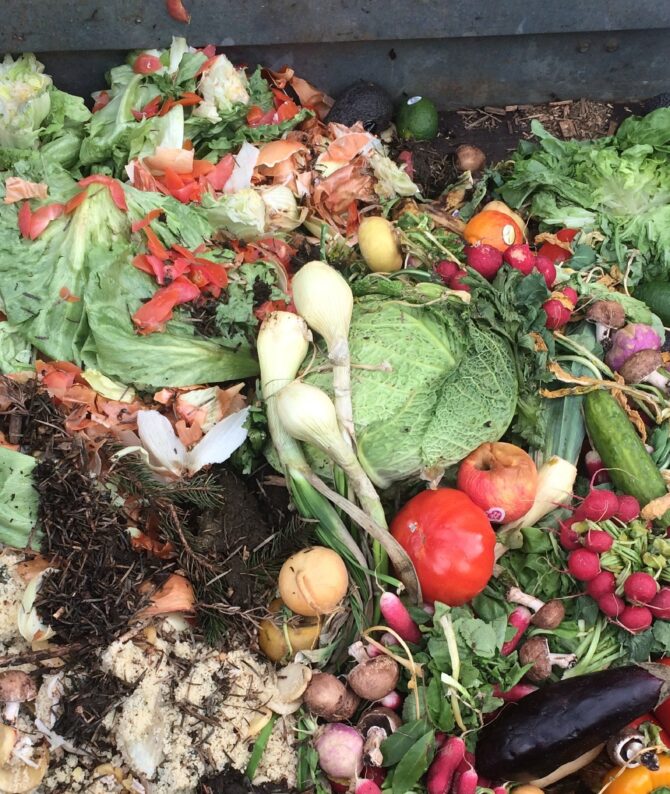Research Paper by Northeastern Student Discusses Climate Justice in Higher Ed

Universities have a responsibility to help pave the way for a more sustainable future, according to Northeastern PhD student Alaina Kinol.
“What I personally would love to see is this commitment at an institution-wide level to climate justice. Recognition that this is the major issue of our generation so universities have a responsibility not to make it worse and, if they have social missions, a responsibility to make it better,” Kinol said.
Kinol, along with four other students and one professor, recently published a paper in renowned science journal Climatic Change titled “Climate justice in higher education: a proposed paradigm shift towards a transformative role for colleges and universities.” The paper explores the current state of climate justice in higher education and the future possibilities for implementing a focus on social science and climate justice within institutions.
The paper was born out of a previous paper that explored designs of Green New Deals in governments, which begged the question, how can something like a Green New Deal be implemented in a different type of governance like a university?
The research team was funded by the Northeastern College of Social Science and Humanities (CSSH) multi-generational research teams grant and facilitated within the NU School of Public Policy and Urban Affairs under the guidance of Dr. Jennie Stephens.The team consisted of undergraduate students Sophie Leggett and Hannah Axtell, masters student Ilana Hirschfeld, PhD students Elijah Miller and Alaina Kinol and Professor Stephens.
Research began in the summer of 2021 when the team met weekly to discuss their work on different subsections of the paper. Over the past year and a half, Kinol has been working with Dr. Stephens to shape the research into a peer-reviewed academic paper.
 Alaina Kinol, Northeastern Ph.D. Student
|
 09/24/20 – BOSTON, MA. – Jennie C. Stephens, Dean’s Professor of Sustainability Science & Policy, and Director of Strategic Research Collaborations, Global Resilience Institute poses for a portrait on Sept. 24, 2020. Photo by Matthew Modoono/Northeastern University |
“This is something that I care deeply about, and as a member of an academic institution feel like I personally should be contributing to,” Kinol said.
The paper explores the different generations of climate policy and the ways in which universities can help embrace what is next.
The first generation of climate policy pre-2000s was simply climate denial. Next was climate isolationism, which referred to attempting to solve the problem in limited, often technology-focused ways without considering how our social infrastructures and ways of life are reinforcing it.
“I think we as a society have, in general, moved past the straight denial that it’s happening. I mean, we’re all experiencing increasing temperatures, unpredictable weather and worldwide catastrophes. We are all collectively starting to reckon that this it’s happening,” Kinol said.
The third generation, which the paper argues that universities should adopt and support, is investment in climate justice, which recognizes disparities caused by climate change and seeks to address its impacts in an equitable way by working with affected communities.
“Within higher education, climate justice action requires continual assessment and systemic intention to prioritize inclusive social and political processes, policies, and practices that reduce climate risks and strengthen climate resilience for marginalized communities rather than perpetuating inequities and disparities,” the Northeastern Faculty Senate Committee on Climate Justice Action Planning report said.
The research paper also discussed how racism and climate change are connected to articulate why antiracist leadership is needed within climate justice, which is further explored in author and professor Stephen’s book “Diversifying Power: Why we need Antiracist, Feminist Leadership on Climate and Energy.”
While universities are pivotal in leading innovating research on solutions to climate crises, the paper argues that ultimately, the science and technology alone are not enough. Instead, they should also look at the role of social structures and how to limit disproportionate impacts of climate change on communities and vulnerable populations.
“When the climate action plans and policies of universities focus on technology-based mitigation which, like the climate action plans of so many other organizations and jurisdictions, fail to consider equity and systemic change, climate injustices are exacerbated,” the paper stated.
Because universities are the center of innovation for tech solutions and science breakthroughs, Kinol believes that they can be centers of innovation for climate justice and moving towards a more equitable future.
“If you want a societal transformation away from dependence on fossil fuels, it’s not just about having clean energy, it’s about how our entire society is organized,” Kinol said. “It’s going to take collective reimagination of the way that our society works and the best place to do that reimagining is in universities. We are so well equipped to do that. This is where thinkers reside. I think that universities are missing an opportunity to lead this transformation.”
Northeastern is currently developing their own climate justice action plan, which is set to be finalized by winter 2024. It will be an update to the 2010 climate action plan where Northeastern vowed to reduce carbon emissions by 80% from 2005. So far, a Faculty Senate Committee on Climate Justice Action Planning, which included Stephens, has made proposed amendments to the plan and the hub has enlisted student fellows to help with the process.
“Leveraging Northeastern University’s capacity to confront the injustices of climate disruptions and facilitate transformation for climate justice and sustainability is both a strategic opportunity and an ethical responsibility,” the faculty senate committee report said.
The March 2022 faculty senate meeting report emphasized leadership, transparent assessment, an inclusive community-engaged approach, and leveraging synergies.
The Climate Justice and Sustainability hub, founded in April 2022, has partnered with Alternatives for Community and Environment, a grassroots environmental justice organization in Roxbury, and One Square World, a community-centered planning and facilitation organization based in Jamacia Plain. Students are getting involved as Climate Justice Action fellows and the Hub has been in communication with various student and community groups. In addition to working on the Climate Justice Action Plan, the hub is heavily involved in transportation efforts, energy efficiency in new projects, student and community engagement and more.
Written by Renée Abbott, March 29th, 2023



